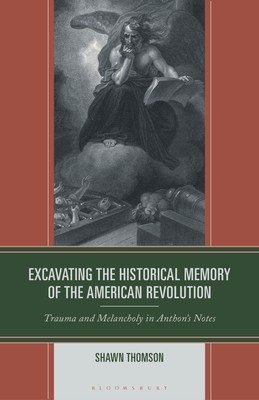
- We will send in 10–14 business days.
- Author: Shawn Thomson
- Publisher: Bloomsbury Academic
- ISBN-10: 1666946257
- ISBN-13: 9781666946253
- Format: 15.2 x 22.9 x 1.9 cm, cietos vākos
- Language: English
- SAVE -10% with code: EXTRA
Excavating the Historical Memory of the American Revolution (e-book) (used book) | bookbook.eu
Reviews
Description
In this book, Shawn Thomson excavates Charles Anthon's personal notes to reveal revolutionary memory and the presence of historical melancholy in this era of radical turnover and shifting alliances.
In these notes, Charles Anthon recorded his personal inquiries into all aspects of life in the Loyalist stronghold of Staten Island from October 13, 1850 to January 8, 1853. Through this written record, Anthon provides a counter history of the Loyalists of Staten Island to the grand narrative of the Patriots of the American Revolution. Through a close reading of Anthon's notes, Shawn Thomson examines how these personal records and historical research hold the places, ruins, artifacts, and, most significantly, the collective and personal memory of Staten Island Loyalists and New Jersey Whigs. Through this close reading, Thomson highlights the indelible link between landscape and memory and offers the reader a sense of the Loyalist melancholy of their abandonment on the day of the British evacuation.EXTRA 10 % discount with code: EXTRA
The promotion ends in 22d.00:36:44
The discount code is valid when purchasing from 10 €. Discounts do not stack.
- Author: Shawn Thomson
- Publisher: Bloomsbury Academic
- ISBN-10: 1666946257
- ISBN-13: 9781666946253
- Format: 15.2 x 22.9 x 1.9 cm, cietos vākos
- Language: English English
In this book, Shawn Thomson excavates Charles Anthon's personal notes to reveal revolutionary memory and the presence of historical melancholy in this era of radical turnover and shifting alliances.
In these notes, Charles Anthon recorded his personal inquiries into all aspects of life in the Loyalist stronghold of Staten Island from October 13, 1850 to January 8, 1853. Through this written record, Anthon provides a counter history of the Loyalists of Staten Island to the grand narrative of the Patriots of the American Revolution. Through a close reading of Anthon's notes, Shawn Thomson examines how these personal records and historical research hold the places, ruins, artifacts, and, most significantly, the collective and personal memory of Staten Island Loyalists and New Jersey Whigs. Through this close reading, Thomson highlights the indelible link between landscape and memory and offers the reader a sense of the Loyalist melancholy of their abandonment on the day of the British evacuation.

Reviews